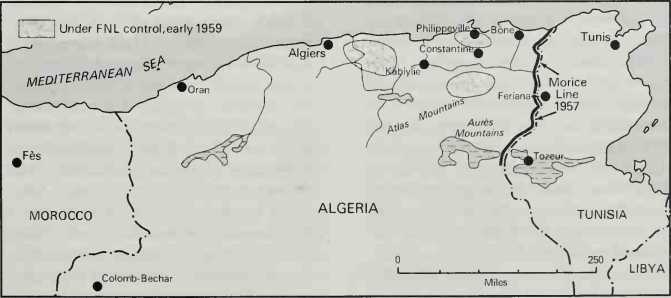
Algeria, 1954-62; ruthless actions by French
Forces failed to crush the fln.
Algerian campaign (1954-62). The colonization of Algeria, beginning in the 1830s, was regarded as an extension of metropolitan France, and “French” cities grew at Algiers, Oran, Philippeville and Bone. The colons, or pieds-noirs as they were contemptuously known, made little effort to integrate their culture with that of the Algerian people. At the same time the growth of Arab nationalism was recognized and feared.
The first serious rebellion against French rule occurred in 1945 and was put down ferociously. Algerian nationalism drew its external support mainly from Egypt during the 1950s. On November 1 1954, Cairo Radio announced the formation in Algeria of the Front de Liberation National or fln. The French were taken by surprise, but the inexperienced rebels initially achieved only limited local success. The French government now took a hard line. The full weight of its armed forces was directed to Algeria and the rebels resorted to terrorist methods, as did the security forces.
Although the French could defeat the rebels in open battle, using helicopters for the rapid deployment of their infantry, the fln established lines of supply across the Tunisian border until this was sealed in 1957 by the construction of the Morice Line, an 8ft (2.4m) electrified fence with mined approaches. In 1957 the French, refusing demands for Algerian independence, mounted a major offensive against urban guerrillas (“the Battle of Algiers”), a textbook example of ruthlessly executed counterinsurgency action. Reports of its savagery spread throughout France, where the fln
Used effective propaganda further to erode national confidence in the Army. By 1958 the fln had established comprehensive military and civilian undergrounds and taken charge of a number of remote areas. Although the French government threw more troops into the struggle, including three divisions actually assigned to nato, the FLN was now too skilful and elusive to be pinned down, and the ruthlessness of the Paras and Foreign Legion soon became counterproductive. The campaign was actually lost by the French government on the home front, with rising opposition to a costly war. In the summer of 1958, the campaign reached a climax with an all-out security operation against the fln’s sanctuary areas in the Atlas and Kabylian mountains. Thousands of the Muslim civilian population were forcibly resettled and their land devastated in an attempt to destroy the fln’s logistic and political base, but Gen de Gaulle, now back in power, sensed the mood of the French people and was already initiating secret talks with the rebels, offering selfdetermination.
As the colons in Algerian towns and cities realized what was happening, they raised barricades, announced their intention to fight to the end, and obtained military support, principally from the Paras, still smarting from the humiliations of Indochina and Suez. A terrorist organization, the Organisation de VArmee Secrete (oas) started a campaign of assassination and terrorism against the fln in Algeria and metropolitan France in September 1960, but the French electorate backed de Gaulle in the election of January 1961. A number of senior Army officers began to plot against him, and units of the Army in Algeria mutinied. De Gaulle appealed to the soldiers over the heads of their disaffected officers, confining the trouble to “hard core” elements of the Paras and Foreign Legion. The mutiny collapsed and de Gaulle went ahead to grant Algerian independence, backed by 90 percent of the French electorate who were sickened by the oas’s terrorist tactics. Despite a further oas revolt, headed by Gen Salan, negotiations with Algerian leaders, headed by Mohammed Ben Bella, were concluded in July 1962. A million settlers left Algeria and the victorious FLN came out of hiding to massacre all Muslims suspected of having helped the French, whilst the OAS persisted for a time with their terrorist campaign. In the longer term, France derived great benefit from the settlement, both economically and politically. The victorious fln, having slaughtered the collaborators, turned on each other, and Ben Bella’s new government soon found itself embroiled in border disputes with its neighbours. MH.
Algerian-Moroccan War (196364). Before the attainment of Algerian independence in 1962, Morocco had been disputing the alignment of boundaries, never formally demarcated during French colonial rule, mainly in the Colomb-Bechar region, into which Moroccan troops penetrated as early as July 1962. Two months later, there was fighting in the Tindouf area, rich in iron ore deposits. By mid-1963, Moroccan forces were in possession of considerable tracts of territory claimed by Algeria and during October there was sporadic fighting in which the Moroccans tended to get the upper hand. In that month, the Emperor Haile Selassie of Ethiopia visited both Algeria and Morocco in an effort to mediate between the two. As a result, King Hassan of Morocco and President Ben Bella met on neutral ground in Mali and agreed a cease-fire, which came into effect early in November with agreement on the establishment of a demilitarized border zone. Algerian casualties in the fighting came to about 60 dead and 250 wounded. No reliable details of Moroccan losses exist. MH.




 World History
World History









